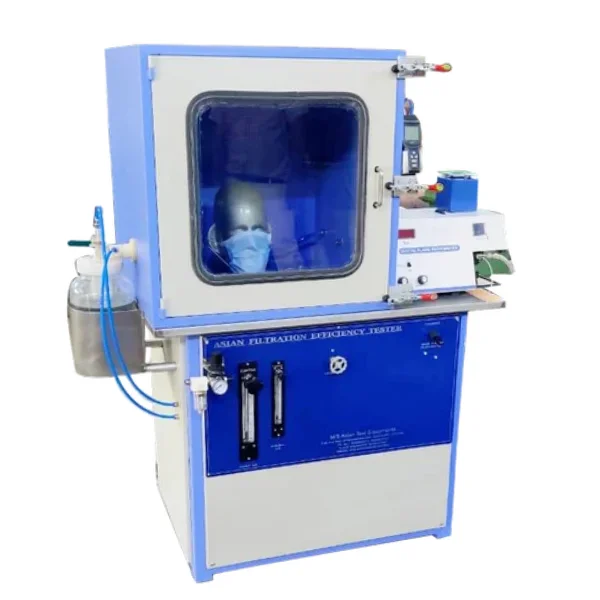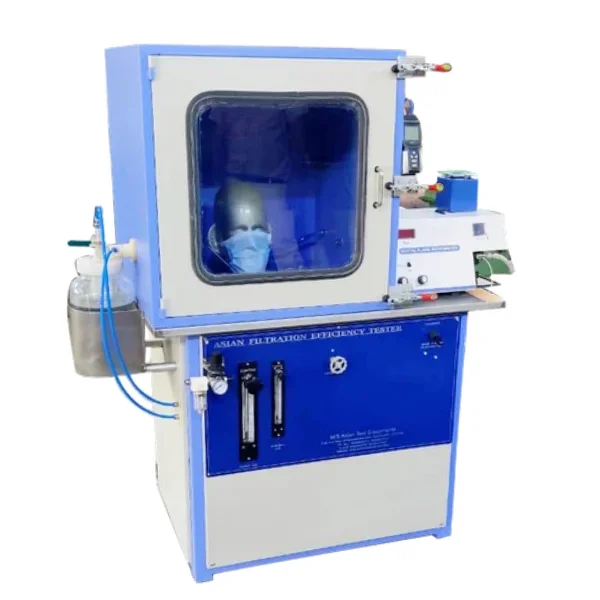
A Mask Filtration Efficiency Tester is a specialized device designed to measure the filtration efficiency of masks and respirators. Filtration efficiency is a critical factor in assessing the ability of a mask to filter out particles, including bacteria, viruses, and other contaminants. These testers are commonly used in quality control, research, and development to ensure that masks meet specific performance standards. Key components and features of a Mask Filtration Efficiency Tester may in....
A Mask Filtration Efficiency Tester is a specialized device designed to measure the filtration efficiency of masks and respirators. Filtration efficiency is a critical factor in assessing the ability of a mask to filter out particles, including bacteria, viruses, and other contaminants. These testers are commonly used in quality control, research, and development to ensure that masks meet specific performance standards.
Key components and features of a Mask Filtration Efficiency Tester may include:
Test Chamber: The device typically includes a test chamber where the mask is securely placed for testing. This chamber is designed to simulate real-world conditions where the mask is exposed to airborne particles.
Aerosol Generator: The tester is equipped with an aerosol generator that produces a controlled concentration of airborne particles. This aerosol simulates the particles that the mask is expected to filter.
Particle Counter: A particle counter is used to measure the concentration of particles before and after they pass through the mask. This allows for the calculation of filtration efficiency.
Control Panel: A user interface or control panel allows the operator to set testing parameters, start and stop the test, and monitor relevant data. This may include settings for particle size, airflow rate, and test duration.
Data Acquisition System: The device may be equipped with a data acquisition system to record and analyze data during the testing process. This system provides information about the mask's filtration efficiency at different particle sizes.
Adjustable Settings: The apparatus typically allows for adjustments in terms of testing parameters to accommodate different mask types and testing standards.
Compliance with Standards: The design and functionality of the Mask Filtration Efficiency Tester should adhere to relevant standards and regulations, which may be specified by organizations such as ASTM International, EN (European Norm), or other regulatory bodies.
Safety Features: Safety considerations are important, and the tester may include features such as emergency stop buttons, safety interlocks, or containment measures to protect operators and prevent potential exposure to aerosolized particles.
Filtration efficiency testing is crucial for assessing the performance of masks and ensuring that they meet specific safety and quality standards. The results of these tests help manufacturers, regulatory bodies, and healthcare professionals make informed decisions about the suitability of masks for various applications. Standards organizations provide guidelines for conducting filtration efficiency tests to ensure consistency and accuracy in testing procedures across different laboratories and industries.

Corrosion test chamber is a great laboratory test equipment widely used in metal...
Cyclic Corrosion Salt Spray Chamber manufactured by Sigma Machines – the world...
Sigma Machines CASS tester is designed keeping in mind the relevant tester stand...
Ensure the quality and durability of your materials with our reliable Double Hea...
SIGMA Machines is counted among the best salt spray chamber manufacturers in Ind...
Enhance your testing capabilities with our advanced digital pounding tester...
Enhance your foam testing process with our advanced PU foam Indentation Hardness...
Enhance your yarn quality control with our reliable and efficient yarn strength ...
Get accurate results with our Shear Fatigue Tester for PU Foam...
Ensure precise measurements of soft materials with our reliable thickness gauge...
Enhance your understanding of ball performance using our reliable Ball Resilienc...
Asian Water Absorption Tester is Water Resistance Tester For Sole Leather- (Perm...
Discover the ultimate laundry solution with Laundrometer Digital Model - the per...
Enhance your testing process with Test Template D and achieve accurate and relia...
Ensure the safety of children's toys with our reliable and efficient flammabilit...
The humidity test cabinet provides a sample with the humidity that the materials...
Ensure accurate results with our advanced Bundesmann Apparatus Tester for compre...
A Hot air oven is a great tool for manufacturers to accurately test materials i...
hydrostatic testing equipment used for testing lateral pipes is located within a...
Enhance belt quality control with our Belt Flex Tester, providing accurate and r...
Rockwell Hardness Tester models are suitable for accurately testing the hardness...
Martindale abrasion machine is suitable for testing the pilling degree and abras...
Adhesion Strength Tester serves the purpose of measuring the peelability or perm...
ASIAN Bursting Strength Tester Machine is especially useful for measuring the pa...
Achieve superior strength and resilience with our cutting-edge tensile strength ...
Enhance your quality control processes with our reliable Impact Tester, providin...
Ensure accurate measurements of your drapes' performance with our reliable Drape...
Glow Wire Test Equipment is an important testing equipment which is used in the ...
The heat distortion temperature of the polymer in the test is identified as the ...
Range: 2000 lbs with 1 lbs least count digital display Elongations: Up to 9...
Torque Tester for Bottle Caps is one of the important instruments to calculate t...
The “ASIAN” Universal testing machine provide a relatively inexpensive way...
Asian Melt Flow Index Tester helping evaluate the flow properties of melted plas...
Size of the Test Specimen: 40 X 15 mm Distance between edge of the Crease...
Box Compression Tester is used to measure the box compression strength (BCT), sh...
Enhance your material testing capabilities with the advanced Demattia Flex Teste...
Enhance your understanding of material properties with our Oscillating Disk Rheo...
Enhance your scientific experiments with our Specific Digital Gravity ...
Looking for an accurate and reliable IRHD Rubber Hardness Tester? Look no furthe...
Explore the world of direct reading specific gravity balance through our informa...
Enhance your testing efficiency and accuracy with our state-of-the-art universal...
Discover the Cone Calorimeter Tester: Enhance fire safety with accurate and reli...
Enhance your testing capabilities with a state-of-the-art dry sand abrasion test...
.jpg)
Get In Touch With Us
See How your Business Can benefit With
Sigma Machines
Get Estimated Quote
